
As this calendar year winds down, I am sure many of you are considering New Year’s Resolutions for a healthier 2019. I am exploring a Ketogenic diet for myself, and will be offering a free six-week Keto Reset program at my store starting on Jan. 20th and our text for these classes will be Mark Sisson’s ”Keto Reset Diet.” A ketogenic diet is basically a paleo diet with low carbs, moderate protein and high fat. While this may not be the best option for everyone, the process to switch to healthier more nutrient diet is a great choice for all. One of the important components of this dietary choice is to make sure you are getting enough sodium and electrolytes, and the ”Hacks” or shortcut keto promoters often miss this important piece of the puzzle. Staying hydrated, while maintaining a healthy sodium and trace mineral balance is key to any dietary program, so I share this important information again as we prepare for a better, healthier 2019.
What is salt? Sodium and chloride molecules combined make up the chemical composition of salt. Sodium chloride is present in ocean water, and makes up 75 percent of the ”salt” in seawater. In our bodies sodium chloride (salt) teams up with potassium, which is our body’s primary intracellular mineral (inside the cells). Sodium is found mostly in extracellular (outside of the cells) tissues. You may have heard about electrolytes, which we replace with drinks such as Gatorade (chock full of artificial ingredients) and Recharge (a much healthier version). These electrolytes are sodium chloride (salt) and potassium, and other trace but important minerals. When these nutrients are in balance we have the correct amount of fluids in all of our bodies cells. This also correlates with the balance of fluids making up our blood volume. If we have a high salt/low potassium diet we increase the blood volume and as a result our blood pressure may be elevated.
Studies have confirmed that maintaining a balance of minerals and electrolytes: sodium, calcium, potassium and magnesium is key to human health. When our bodies lose these electrolytes through perspiration or diarrhea the results can be serious. If we drink only water after exercise, our usual electrolyte balance is not restored and we suffer from hyponatremia, or ”water intoxication.” A pinch of good quality unrefined sea salt, not enough to even taste will help maintain your electrolyte balance and increase your stamina…this is ”Gatorade” without the sugar and toxic coloring and flavoring chemicals.
In his book, Staying Healthy with Nutrition, Elson Haas, M.D. states that ”Where natural foods are the only sources of sodium, there is almost no hypertension and the resulting high blood pressure. These foods contain more potassium, which is found in high amounts in plant cells as well as in human cells.” In his section on sodium, he talks about the controversy around sodium intake and its effect on blood pressure. Dr. Haas suggests that some researchers believe the key to controlling blood pressure and hypertension is controlling the potassium-to-sodium ratios. The processed foods most of us eat are generally higher in sodium, and lower in potassium. When we make our food from scratch and use a good quality salt we will have a healthier electrolyte balance. Some healthy salts available at most health food stores are Real Salt, Himalayan Salt and Celtic Salt. If your sea salt is white in color, it has most likely been ”refined” and the critically needed electrolytes will be missing.
Dr. James DiNicolantonio, a leading cardiovascular research scientist, has reviewed over 500 publications to unravel the impact of salt on blood pressure and heart disease. He’s reached a startling conclusion: The vast majority of us don’t need to watch our salt intake. In fact, for most of us, more salt would be advantageous to your health. In his book, The Salt Fix, he tells the remarkable story of how salt became unfairly demonized – a never-before-told drama of competing egos and interests – and took the fall for another white crystal: sugar.
In his book, DiNicolantonio suggests that, in fact, too little salt can:
■ Cause you to crave sugar and refined carbs.
■ Send the body into semi-starvation mode.
■ Lead to weight gain, insulin resistance,
type 2 diabetes, cardiovascular disease, chronic kidney disease and an increased blood pressure and heart rate.
On the other hand, eating the salt your body desires can improve everything from your sleep, energy and mental focus to your fitness, fertility, and sexual performance. Along with staving off common chronic illnesses, including heart disease.
It’s best to eat foods that are less processed – foods with less ”ingredients.” One of those ”ingredients” in most of our processed foods is the sodium, which again refined is out of balance with potassium and missing the other electrolyte minerals. On a simple diet of organic fruits/vegetables, free range meats, whole grains, organic and/(if available raw) dairy and the best quality sea salt, our bodies will be able to have the correct balance of the important electrolytes. As I have suggested before do not eat foods that your grandparents would not recognize. Add regular exercise, and plenty of pure water and the result is better health and vitality. More information about my Keto Reset series to come. Salud.
At Natural Grocers in Eugene, where I am the store’s Nutritional Health Coach, we offer free classes that include plenty of information about healthy eating choices, and free one-on-one health coaching sessions (call 541-345-3300). Please ”like” our Natural Grocers-Eugene Facebook page. Find our store’s schedule of free classes at: https://www.naturalgrocers.com/store-location/eugene/.







